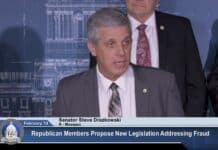
(Daily Caller News Foundation) — An upcoming rule from the Federal Housing Finance Agency (FHFA) — which oversees mortgages backed by Fannie Mae and Freddie Mac — will hide the “true risk” of subsidized home loans to low credit borrowers, while raising fees for those with higher credit, industry experts told the Daily Caller News Foundation.
The new FHFA rules are set to go into effect May 1, and could see costs decline by roughly 2% for affected homebuyers with lower credit scores, while climbing by up to 0.75% for those with higher credit scores, NBC reported. The FHFA hopes that the policy will boost “equitable and sustainable access to homeownership” amid soaring mortgage rates and home costs over the past year and first-time homebuyers representing a record-low market share in 2022.
“Interest rates are becoming irrelevant and a poor indicator of default risk because of these onerous and ridiculous regulations,” Heritage Foundation economist E.J. Antoni told the DCNF, characterizing the FHFA move as a “subsidy” funded by an “effective tax” on people with higher credit. “Blindly pushing for minority homeownership without respect to individuals’ ability to repay loans required ignoring things like credit scores, which is effectively what’s happening now — banks will have to lend to riskier customers to stay competitive, while punishing their best customers. In a word, insanity.”
Jason Sorens, an economist at the American Institute of Economic Research, noted that since the rule applies to all mortgages backed by Fannie Mae and Freddie Mac, not only did the new rules shift fees towards borrowers with higher credit, it also put taxpayers in general at risk, in a statement to the DCNF.
“The taxpayer is subsidizing all of these mortgages,” said Sorens, who noted that under the new rules homebuyers with higher credit scores would still pay lower rates overall. “The problem is that these rates aren’t being set in the market, and none of them reflect the true risk of default. A lot of these loans could go bad and leave taxpayers on the hook.”
Sent a letter with Senator @RogerMarshallMD expressing our concern and disapproval of this proposed policy. https://t.co/7looePj79t
— Senator Marco Rubio (@SenMarcoRubio) April 27, 2023
Homebuyers making down payments between 15% to 25% with credit scores greater than 680 will see their rates climb by up to 0.15 percentage points, according to a report from The National Association of Realtors (NAR). Those with credit scores less than 680 could see their mortgage fees decline by as much as 0.175 percentage points within the same range of down payments.
The NAR supported the reduction in fees for those with lower scores, which it considers to be an “important change” in combating the decreased affordability of housing over the past year, according to its report. However, since Fannie Mae and Freddie Mac saw their profits climb by $12.9 billion and $9.3 billion respectively in 2022, the group argued it was unnecessary to burden high scoring homebuyers with increased fees.
“This group [of homebuyers] is a significant segment of [Fannie Mae and Freddie Mac’s] portfolio and represents both trade-up borrowers and middlewealth Americans,” wrote NAR president Kenny Parcell. “These borrowers face the same surge in financing costs as entry level homebuyers experienced over the last year.”
Sorens doubted the ability of the policy to make homes more affordable for buyers with poor credit, since subsidization of financing would likely drive up the cost of homes attractive to such buyers. He went on to say that without addressing the ongoing shortage of inventory, boosting affordability by subsidizing housing demand “is like trying to carry water in a sieve.”
The Federal Housing Administration (FHA) — which is independent of and unrelated to the FHFA despite its similar name — in February “reduced its mortgage insurance premium by about the same amount” as the upcoming FHFA rule, an NAR spokesperson told the DCNF. “Thus, the fee reductions at Fannie and Freddie are roughly break-even and won’t draw many more borrowers into the market.”
FHFA Director Sandra Thompson — a Biden appointee — issued a statement April 25, amid ongoing pushback on the rule from conservative lawmakers, arguing that most criticism of the rules advanced a “fundamental misunderstanding” of the situation. The updated fee structure would “bolster safety and soundness,” help federal mortgage providers better fulfill their statutory objectives, and “more accurately align pricing” with loans’ expected performance and risk.
“Some mistakenly assume that the prior pricing framework was somehow perfectly calibrated to risk — despite many years passing since that framework was reviewed comprehensively,” Thompson said in her statement. “The fees associated with a borrower’s credit score and down payment will now be better aligned with the expected long-term financial performance of those mortgages relative to their risks.”
The FHFA did not immediately respond to a DCNF request for comment.










